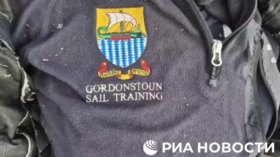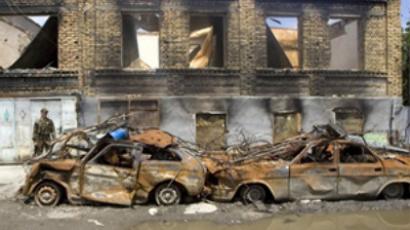CIA shrugs off WikiLeaks “exporter of terrorism” release

The whistle-blowing website released a CIA report on Wednesday that examines the consequences if foreign countries begin to perceive the US as an “exporter of terrorism.”
The secret memo that found its way into WikiLeaks' in-box asks the hypothetical question: "What will happen if it is internationally understood that the United States is an exporter of terrorism.”
The opening paragraph of the CIA document, which may be downloaded free-of-charge from the site, states, “Contrary to common belief, the American export of terrorism or terrorists is not a recent phenomenon, nor has it been associated only with Islamic radicals or people of Middle Eastern, African or South Asian ethnic origin. This dynamic belies the American belief that our free, open and integrated multicultural society lessens the allure of radicalism and terrorism for US citizens.”
In other words, terrorist organizations operating outside of the United States use those guarded liberties now granted (and largely taken for granted, it seems) to every American citizen, including the the luxury of racking up frequent-flier mileage, to lure them into misadventure overseas.
The secret memo then provided a brief chronology of such nefarious events, including an incident last year that witnessed five young Muslim American men traveling from northern Virginia to Pakistan, where they allegedly joined the Pakistani Taliban to engage in jihad.
Another example reached back as far as 1994 when Baruch Goldstein, an American-Jewish doctor from New York, "emigrated to Israel, joined the extremist group Kach, and killed 29 Palestinians during their prayers in the mosque at the Tomb of the Patriarchs in Hebron which helped to trigger a wave of bus bombings by HAMAS in early 1995.”
The report then warned of the possibility that passport-carrying Americans may be lured into working for Al-Qaeda.
“Undoubtedly Al-Qa’ida and other terrorist groups recognize that Americans can be great assets in terrorist operations overseas because they carry US passports, don’t fit the typical Arab-Muslim profile, and can easily communicate with radical leaders through their unfettered access to the internet and other modes of communication,” the report said.
Social-networking services apparently also pose a security threat from “radical clerics and terrorist recruiters.”
“The ubiquity of internet services around the world and the widespread use of English on popular websites such as Youtube, Facebook, Myspace, Twitter and various blogs enable radical clerics and terrorist recruiters to bypass America’s physical borders and influence US citizens,” the CIA memo warns.
The three-page memo, as described in the margins of the CIA document, was prepared by the so-called CIA Red Cell, which has been charged by the Director of Intelligence with taking a pronounced "out-of-the-box" approach that will provoke thought and offer an alternative viewpoint on the full range of analytic issues.
The term “exporter of terrorism” that appears everywhere in the report is somewhat misleading, in that it suggests the United States is deliberately exporting terrorists abroad like some sort of hot commodity. In reality, the report examines the threat of the US turning into something of a terrorist breeding ground, vulnerable to enticements by evil-minded individuals overseas.
“Exporter of terrorism” reputation feared
The CIA document went on to warn that if “the US were seen as an exporter of terrorism, foreign partners may be less willing to cooperate with the United States on extrajudicial activities, including detention, transfer, and interrogation of suspects in third party countries.”
It has already been reported although never fully revealed that the United States, with the cooperation of particular Eastern European countries, organized “black site” detention facilities where suspected terrorists and other “illegal combatants” are subjected to torture, or, for those who prefer the more sanitized, euphemistic term, “enhanced coercive interrogation techniques."
On June 27, 2006, the Parliament Assembly of the Council of Europe (PACE) accused the United States of operating a "clandestine spider web of disappearances, secret detentions and unlawful inter-state transfers." The lawmakers called for EU regulations governing foreign intelligence services operating in Europe, and demanded “human rights clauses” in military base agreements with the US.
The CIA memo warned, a bit hypocritically it must be added, that “if the US were seen as an 'exporter of terrorism,' foreign governments could request a reciprocal arrangement that would impact US sovereignty.”
Now where have we heard of that trick before?
Foreign “regimes” could request information on US citizens they deem to be terrorists or terrorist supporters, or even request the rendition of US citizens. The CIA memo, however, failed to mention that the US government already has the authority, thanks to the Patriot Act, to “request information on US citizens,” right down to what library books they are checking out of their local libraries or the emails they are sending. These powers have not been rescinded under President Barack Obama.
The report warns that foreign countries may start behaving exactly like the US has in the past in its war on terror, and “consider secretly extracting US citizens suspected of foreign terrorism from US soil.”
CIA shrugs off release
The Central Intelligence Agency brushed off the released report's significance, arguing that its analysts were simply forwarding hypothetical scenarios and presenting alternate views.
"These sorts of analytic products – clearly identified as coming from the Agency's 'Red Cell' – are designed simply to provoke thought and present different points of view," said spokesman George Little.
Indeed, some may wonder why WikiLeaks founder Julian Assange bothered to announce the publication of a secret CIA memo that in itself offers precious little revelations.
The document succeeds at exposing the hypocritical train of thought of the US intelligence community, yet it exposes nothing that is not already known. And as for the expressed fear that foreign “regimes” may enter US territory and escape with a batch of US-born terrorists, this is simply a fantasy born out of the likes of a Tom Clancy novel and handsomely subsidized by US taxpayers.
Although there may be some gaping cracks in Fortress America, it requires the greatest stretch of the imagination to believe that an ally would risk its friendship with the United States just to whisk out some homegrown radicals in the middle of the night. After all, the US intelligence community was able to pull off such a stunt abroad because it worked in collaboration with its allies, not against them.
Although WikiLeaks hit a grand slam with the release of some 70,000 secret documents on the War in Afghanistan, with another 15,000 documents yet to come, the CIA memo put out for public consumption yesterday has proven to be a disappointment, at least for those hoping for new nuggets of intrigue involving the internal workings of the intelligence community.
To quote one CIA officer, “this is no block-buster release.”













